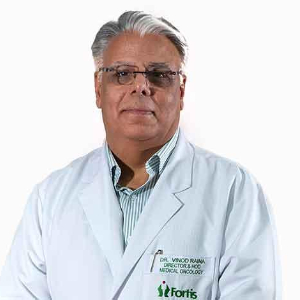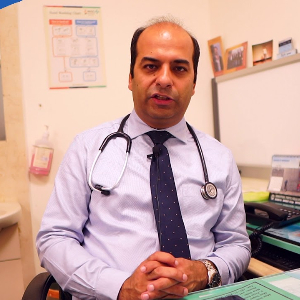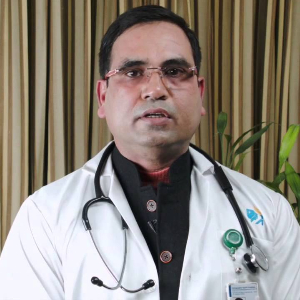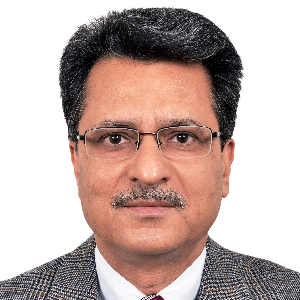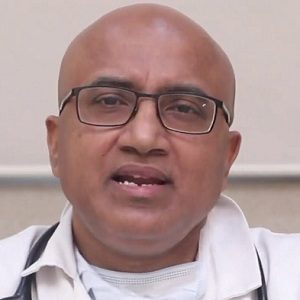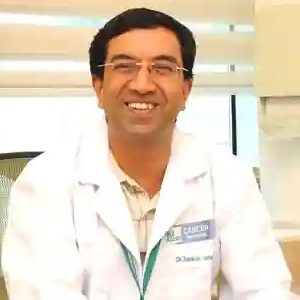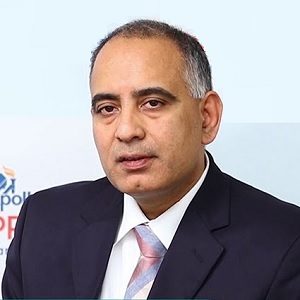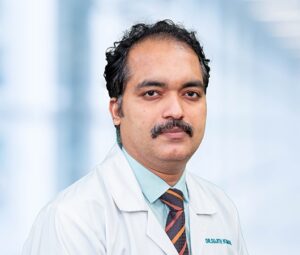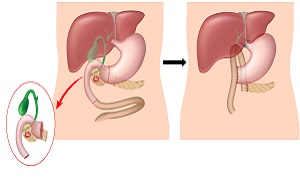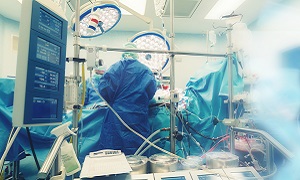Best Pancreatic Cancer Treatment Doctors in India
- Medical Oncologist, Gurugram, India
- Over 40 years’ experience
- Fortis Memorial Research Institute
Profile Highlights:
- Dr. Vinod Raina is a distinguished figure in the field of Medical Oncology in India, with over 40 years of exemplary experience. He is currently associated with Fortis Memorial Research Institute in Gurugram where he is functioning as the Director and Head of Medical Oncology and Hematology.
- His primary expertise lies in Chemo treatment and is the first to perform high-dose chemo in India. He also performed the first peripheral blood BMT in India.
- Additionally, Dr. Raina possesses specialized expertise in treating a wide spectrum of cancers including Breast Cancer, Lung Cancer, Gastrointestinal Cancer, Urological Cancer, Gynecological Cancer, Lymphoma, and Myeloma. His contributions extend to performing approximately 400 BMTs, enhancing treatment options for various cancers.
- Medical Oncologist, Gurugram, India
- 15+ years’ experience
- Fortis Memorial Research Institute
Profile Highlights:
- Dr. Ankur Bahl is a distinguished Senior Director of Medical Oncology at Fortis Memorial Research Institute (FMRI), Gurugram, with over 15 years of extensive experience in the field of oncology.
- Dr. Bahl completed his MBBS and MD in Medicine from Maulana Azad Medical College, Delhi. He further specialized by earning a DM in Medical Oncology from the prestigious All India Institute of Medical Sciences (AIIMS), New Delhi.
- His clinical expertise encompasses a broad range of oncology treatments, including immunotherapy, targeted therapies combined with chemotherapy, hormonal therapy, as well as supportive and palliative care.
- Top Medical Oncologist | Apollo Hospital, New Delhi, India
- 20+ Years Experience
- Indraprastha Apollo Hospital, New Delhi
Profile Highlights:
- Dr. Manish Singhal is a highly experienced medical oncologist based in South Delhi, with a distinguished career spanning over 20 years. Currently, he is practicing as a Consultant in Medical Oncology at Apollo Hospital, New Delhi.
- Dr. Singhal is widely recognized as one of the top medical oncologists in the region, celebrated for his expertise in delivering personalized treatment plans tailored to each patient’s unique needs.
- Specializing in the diagnosis and treatment of various cancers, including breast, lung, oral, melanoma, and osteosarcoma, Dr. Singhal offers comprehensive care that includes advanced treatments like BMT, hormone treatment for prostate cancer, and chemotreatment for hematological malignancies.
- He employs state-of-the-art diagnostic techniques to ensure precise diagnoses, enabling him to craft individualized treatment strategies that optimize efficacy while minimizing side effects.
- Top Medical Oncologist | Apollo Hospital, New Delhi, India
- 20+ Years Experience
- Indraprastha Apollo Hospital, New Delhi
Profile Highlights:
- Dr. P.K. Das is a highly esteemed medical oncologist in Delhi, renowned for his extensive experience spanning over 20 years.
- His practice is dedicated to providing comprehensive and compassionate care to patients grappling with various types and stages of cancer.
- Specializing in medical oncology, Dr. Das possesses profound expertise in diagnosing and treating cancers affecting diverse organs including breast, lung, colon, prostate, pancreas, liver, and kidney.
- Medical Oncologist: Artemis Hospital
- Over 10 Years' Experience
- Artemis Hospital, Gurgaon
Profile Highlights:
- Dr. Priya Tiwari is a distinguished Medical Oncologist based at Artemis Hospitals in Gurugram, renowned for her expertise in comprehensive cancer care.
- She has 10 years of experience.
- Her medical education includes an MD in Medicine and a DM in Medical Oncology from AIIMS, alongside an MBBS degree from IMS, BHU, where she was a gold medalist.
- Medical Oncologist, Gurugram, India
- Over 30 years’ experience
- Medanta-The Medicity, Gurgaon
Profile Highlights:
- Dr. Ashok Kumar Vaid is a reputed Medical Oncologist in India with expertise in the treatment of blood, lung, skin, breast, and gastrointestinal cancers.
- He is famously known for performing among the first 25 BMTs in a private hospital in India.
- Dr. Vaid’s primary area of focus lies in Leukemia, Lymphoma, Solid tumors, and the treatment of organ-specific benign and malignant tumors.
- He prefers to treat his patients using non-surgical and pain-free techniques that include Hormone Medicine, Biological Treatment, Targeted Treatment, and Chemo Treatment.
- Top Medical Oncologist | Apollo Hospital, New Delhi, India
- 15+ Years Experience
- Indraprastha Apollo Hospital, New Delhi
Profile Highlights:
- Dr. Dipanjan Panda is one of the well-known medical oncologists in India, having 15 years of expertise in treating bone and soft tissue cancers and gastrointestinal cancers.
- He is credited with starting the country’s first anticancer departments and PDCC program. Dr. Panda developed a medical oncology unit at Indraprastha Apollo Hospital in New Delhi, in association with the Institute of Liver and Biliary Sciences. He is currently working at Indraprastha Apollo Hospital in New Delhi as a Senior Consultant, Medical Oncology.
- Dr. Panda has written twenty peer-reviewed papers in national and international journals. He has presented numerous talks at global forums.
- Medical Oncologist, Chennai, India
- Over 28 years’ experience
- Apollo Cancer Centre Chennai
Profile Highlights:
- Dr. Sankar Srinivasan is one of the top Medical Oncologists in India with proficiency in cancer management for about 28 years.
- He got certified in Internal Medicine, Medical Oncology, and Hematology from American Board to enhance his skills.
- Dr. Srinivasan is placed in the best 10% of the Hematologists boards.
- He is an active member of several International Medical Association Boards.
- Medical Oncologist and BMT Specialist, Chennai, India
- Over 25 years’ experience
- Apollo Cancer Centre Chennai
Profile Highlights:
- Dr. Raja T is a renowned Medical Oncologist from Tamil Nadu who is currently serving as the Director of Medical Oncology at Apollo Cancer Centre in Chennai.
- He is well proficient in conducting a number of cancer procedures such as Cancer Screening, Chemo Treatment, PICC Line Insertion, BMT, Pap collection, lymphoma, Renal Cell Cancer management, and Head and Neck Tumor.
- Along with his clinical practice, Dr. Raja T is also a renowned veteran who has been the Principal Investigator for several clinical studies, a published author for journals, and a teacher.
- Medical Oncologist, Chennai, India
- Over 12 Years Experience
- Apollo Proton Cancer Centre
Profile Highlights:
- Based in Chennai, Dr. Sujith Kumar Mullapally is a skilled Medical Oncologist who is currently practicing as a Consultant Medical Oncologist at the Apollo Proton Cancer Centre, Chennai.
- Dr. Mullapally is quite versatile as he specializes in a range of oncology specialties. Thoracic Oncology, Neuro-Oncology, Head & Neck Oncology, Genitourinary Oncology and Bone & Soft Tissue Tumors are just a few of his expertise. In addition, he has a great deal of interest in Immuno-Oncology and Preventive Oncology.
- To detect various cancer forms early on, Dr. Mullapally uses cutting edge diagnostic methods including biopsies and imaging tests (X-rays, CT scans).
- As a specialist, Dr. Mullapally is aware of the difficulties in identifying and managing cancer. So as soon as a patient notices symptoms or has worries about their health, he advises them to consult a specialist who can offer more focused treatment.
- Following a diagnosis, Dr. Mullapally develops individualized treatment plans for patients that might involve immuno treatment, chemo treatment, radiation treatment, or surgery. These treatments are intended to minimize adverse effects while optimizing efficacy, and they are customized to meet the specific needs of every patient.
Best Pancreatic Cancer Treatment Hospitals in India
- City: Gurugram, India
Hospital Highlights:
- One of India’s best and largest multi-specialty hospitals, Medanta was built with the aim to bring India to the highest standards of medical care. The hospital has been providing the best medical services to its patients, since its inception, with care, commitment, and compassion.
- Equipped with 1250 beds, the hospital was founded by Dr. Naresh Trehan in the year 2009 with an aim to provide the best medical care at affordable costs. The hospital is spread across 43 acres and includes 45 operation theatres and 350 beds dedicated solely to ICU. The hospital includes over 800 doctors, and more than 22 specialty departments and has a dedicated floor for individual specialty in order to offer the best services under one roof.
- The hospital is considered one of the premier institutes in India for Cardiac Care and includes staffs and members of high caliber. The hospital has 6 distinct centers of excellence.
- City: Gurugram, India
Hospital Highlights:
- Artemis Hospital, established in 2007 in Gurugram, India, is a leading multi-specialty institution known for its excellence in patient care and advanced medical technology, offering comprehensive services across specialties like Cardiology, Oncology, Neurology, Orthopedics etc.
- Renowned for its patient-focused care, Artemis Hospital combines state-of-the-art infrastructure with a team of internationally trained doctors and surgeons, ensuring the highest standards of medical treatment.
- Accredited by JCI and NABH, Artemis Hospital meets global healthcare quality and safety standards, reflecting its commitment to providing compassionate, personalized care.
- The hospital is recognized for utilizing cutting-edge diagnostic and ther*peutic techniques, ensuring patients receive accurate diagnoses and effective treatments tailored to their needs.
- City: Chennai, India
Hospital Highlights:
- The Apollo Proton Cancer Centre in Chennai is the most sought-after private cancer hospital in India. It is an integrated facility that provides cutting-edge, all inclusive cancer treatment to patients all over the globe.
- The hospital is a part of the renowned Apollo Group which has a large network of over 74 hospitals in India and across the globe. Out of the 74 hospitals, 21 of them are cancer centres. However, Apollo Proton Cancer Centre is the only cancer hospital to have JCI accreditation.
- The Centre, which was established on the principles of excellence and expertise, unites a formidable medical staff led by some of the most illustrious figures in cancer treatment.
- The hospital follows the global ASTRO Model Policy. It is the same global policy which is followed by countries like USA, UK, and Europe.
- Apollo Proton Cancer Centre is among the very few hospitals in India to receive patients from First World countries such as USA, Canada, New Zealand, Australia, Singapore, Thailand, etc.
- Apart from that, it is also the first hospital in Chennai to receive patients from several countries like Uzbekistan, Kazakhstan, Turkmenistan, Georgia, Armenia, Azerbaijan, SAARC countries (Bangladesh, Nepal, Sri Lanka, Maldives, Bhutan, Afghanistan, and Pakistan), South Africa, Turkey, Egypt, etc.
- In fact, there is a dedicated team at the Apollo Proton Cancer Centre that serves only international patients. Thus, on a monthly basis, the Centre receives patients from across 32 countries.
- Moreover, there are certain treatments in Apollo Proton Cancer Centre that are not available in any other centre. APCC addresses all types of possible cancers that are usually not covered by any other centre.
- City: New Delhi, India
Hospital Highlights:
- Over the last 33 years, the Fortis Escorts Heart Institute has set new standards in cardiac treatment with groundbreaking research. It is now known around the world as a centre of expertise for Cardiac Bypass Surgery, Interventional Cardiology, Non-invasive Cardiology, Paediatric Cardiology, and Paediatric Cardiac Surgery.
- The hospital has cutting-edge laboratories that perform a wide range of diagnostic tests in Nuclear Medicine, Radiology, Biochemistry, Haematology, Transfusion Medicine, and Microbiology.
- Fortis Escorts Heart Institute boasts a diverse group of bright and experienced doctors who are backed up by a team of highly qualified, experienced, and devoted support professionals as well as cutting-edge equipment such as the recently installed Dual CT Scan.
- Approximately 200 cardiac doctors and 1600 personnel currently collaborate to manage over 14,500 admissions and 7,200 emergency situations each year. The hospital now has a 310-bed infrastructure, as well as five cath labs and a slew of other world-class amenities.
- City: Gurugram, India
Hospital Highlights:
- Fortis Memorial Research Institute (FMRI) is a premier multi-super-specialty, quaternary care hospital, known for its exceptional international faculty, top-tier clinicians, super-sub-specialists, and specialized nurses, all supported by cutting-edge technology.
- It is the flaship hospital of Fortis Healthcare Limited, part of IHH Healthcare Berhad, a leading integrated healthcare services provider in India. As one of the country’s largest healthcare organizations, Fortis operates 28 healthcare facilities with over 4,500 operational beds (including O&M facilities) and more than 400 diagnostic centers (including joint ventures).
- Recognized as one of the top hospitals in India, FMRI serves as a leading referral center and aspires to be the ‘Mecca of Healthcare’ for India and beyond. Its 11-acre campus is a testament to its commitment to providing world-class healthcare.
- Accredited by JCI and NABH, FMRI is dedicated to maintaining the highest standards of healthcare quality and safety, ensuring that every patient receives the best possible care. The hospital’s reputation is further enhanced by its state-of-the-art facilities and innovative medical practices.
- City: New Delhi, India
Hospital Highlights:
- The Indian Spinal Injuries Center (ISIC), provides state-of-the-art facilities for the management of all types of spinal ailments.
- Staffed with internationally trained, acclaimed, and dedicated spine surgeons, the hospital provides cutting-edge medical & surgical technology. The hospital provides comprehensive management of spinal injury, back pain, spinal deformities, tumors, osteoporosis, etc.
- The hospital performs motion-preserving spine surgeries including disc replacement and dynamic fixation, and minimally invasive spine surgeries such as endoscopic disc excision.
- The orthopedic service of the hospital covers all orthopedic ailments including trauma, joint diseases & replacements, oncology, pediatric orthopedics & upper limb ailment.
- City: Faridabad
Hospital Highlights:
In the sprawling city of Faridabad, where healthcare needs are diverse and ever-evolving, one institution has consistently stood out as a beacon of excellence in the field of medicine—Marengo Asia Hospital. Established with a vision to provide world-class healthcare services to the community it serves, Marengo Asia Hospital has emerged as a trusted name synonymous with quality, compassion, and innovation in healthcare.
- City: New Delhi, India
Hospital Highlights:
- Indraprastha Apollo Hospital is a 700-bedded multispecialty hospital in the heart of the capital of India. It is a part of Apollo Hospital group, one of India’s most reputed healthcare chains. Indraprastha Apollo Hospital has been accredited by Joint Commission International, making it the first internationally accredited hospital in the country in 2005.
- There are 52 specialties in the hospital with one of the best cardiology centers in the country. The hospital is also equipped with State of the art infrastructure facilities with the largest Sleep Lab in Asia and the largest number of ICU bed facilities in India.
- The latest and highly advanced technologies that are installed in the hospital include Da Vinci Robotic Surgery System, PET-MR, PET-CT, Cobalt-based HDR, Brain Lab Navigation System, Tilting MRI, Portable CT scanner, 3 Tesla MRI, 128 Slice CT scanner, DSA Lab, Endosonography, Hyperbaric Chamber and Fibro scan.
- City: New Delhi, India
Hospital Highlights:
- One of the well-regarded providers in India committed to the highest standards of clinical excellence and patient care, Max Super Specialty Hospital is a part of Max Healthcare, which is the second-largest healthcare chain in India. Regarded as one of the most well-regarded healthcare providers in the country, Max Super Specialty Hospital is committed to the highest standards of clinical excellence as well as patient care. The hospital is also equipped with the latest technology as well as cutting-edge research. The hospital is known to deliver and ensure the highest level of patient care.
- The hospital has more than 500 beds and offers treatment for over 35 specialties. The hospital also holds the credit of having installed the first Brain Suite in Asia. This is a highly advanced Neurosurgical machine that allows MRI to be taken while surgery is ongoing.
- Other advanced and latest technologies are also installed in the hospital such as the 1.5 Tesla MRI machine, 64 Slice CT Angiography, 4D ECHO, LINAC, and 3.5T MRI machine.
- City: Kolkata, India
Hospital Highlights:
- Founded in 2017, the HCG EKO Cancer Centre is a committed, all-inclusive cancer care facility in Kolkata.
- The hospital was collaboratively established by India’s leading cancer care provider HCG (HealthCare Global Enterprises Ltd.), and EKO Diagnostic Pvt. Ltd., a top diagnostic and imaging chain in Eastern India.
- With 88 beds, the hospital provides a full spectrum of services including diagnosis, prevention, screening, second opinions, treatment, rehabilitation, follow-up, and palliative care.
- Additionally, the hospital contains a day-care chemotherapy ward, Neutropenic ward, medical ICU, pharmacy, blood bank, and an IPD wing.
- At HCG EKO Cancer Centre Kolkata, a large team of cancer experts with experience in medical oncology, surgical oncology, radiation oncology, hemato oncology, BMT, and nuclear medicine collaborate to offer a variety of treatment options under one roof.
- Furthermore, the hospital is also known for employing the most advanced radiation technology such as, the Radixact, a next-generation TomoTherapy equipment that provides greater radiation delivery precision.
Pancreatic Cancer
Pancreatic Cancer is the cancer that begins in the tissues of the pancreas.
Pancreas is the organ that lies behind the lower part of the stomach. The main function of pancreas is that it releases enzymes that help in digestion & hormones that manages the blood sugar level.
Pancreatic cancer is hardly ever detected in early stages since it shows no symptom in early stages. It gets noticed when it has already spread to other organs (4th or 5th stage), thereby making treatment quite difficult.
Signs & symptoms of Pancreatic Cancer
- Fatigue
- Loss of appetite
- Jaundice
- Pain in the upper abdomen.
- Back pain
- Nausea & vomiting
- Malaise, feeling of discomfort or unease whose exact cause is not known.
Causes & risk factor of Pancreatic Cancer
- Smoking
- Diabetes
- Family history of pancreatic cancer.
- Pancreatitis (swelling of pancreas)
- Ulcer in the stomach
- Alcohol consumption
- Obesity
- Pancreatic cancer is more common in older people
Types of Pancreatic Cancer
There are two major types of Pancreatic Cancer:
- Exocrine Pancreatic Cancer- It is the cancer that begins in the exocrine cells, cells that produces pancreatic digestive juices. Exocrine Pancreatic Cancers make up for about 95% of Pancreatic Cancers. The sub-types of Exocrine Pancreatic Cancer are:
- Adenocarcinomas- These begin in the cells that line the ducts of the pancreas & are the most common type of exocrine pancreatic cancer, accounting for around 90% of Pancreatic cancers.
- Squamous Cell Carcinoma (rare type)
- Adenoquamous Carcinoma (rare type)
- Colloid Carcinoma (rare type)
- Endocrine Pancreatic Cancer- These begin in that part of pancreas where Insulin and other hormones are made and released directly into the blood. Endocrine Pancreatic Cancers are named after the hormone they produce like gastrinomas produce a gastrin & insulinomas produce insulin to name a few. They make up for less than 5% of Pancreatic Cancers.
*Benign cysts and lesions in Pancreas- These can be precancerous formations and are generally removed once noticed, or closely monitored for malignancy.
Stages of Pancreatic Cancer
- Stage 1: Cancer is limited to the pancreas.
- Stage 2: Cancer is confined to the pancreas but the tumour has grown in size (greater than 2 but no more than 4 centimeters).
- Stage 3: The tumour is over 4 centimeters in size and the cancer may have spread to nearby lymph nodes.
- Stage 4: The cancer has spread to the nearby blood vessels or nerves.
- Stage 5: Cancer has spread to distant organs.
Diagnosis of Pancreatic Cancer
- Blood Test
- PET scan- It helps to check the degree of pancreatic cancer spread
- Endoscopic Ultrasound
- MRI
- Biopsy- Tissue sample from the suspicious area is taken & send for examination. Biopsy can be performed in the following way:
- Percutaneous needle biopsy also known as fine needle aspiration (FNA)- A needle is inserted into the mass & some tissue is captured.
- Endoscopic retrograde cholangiopancreatography (ERCP)- In this process a flexible tube with a camera and other tools on its end (endoscope) is put through the mouth to the small intestine, near the pancreas. & helps to collect images as well as tissue sample of the affected area.
Treatment of Pancreatic Cancer
The Treatment of Pancreatic Cancer depends on the stage and grade of cancer. After evaluation of the aforesaid through proper investigations, your oncology team will decide on your treatment plan or protocol. Following are the options considered for effective Pancreatic Cancer Treatment.
Surgery
There are quite a few different types of surgery that are done for Pancreatic Cancer depending on the size of the tumor and organs involved.
Whipple Procedure
It is also known as pancreaticoduodenectomy. In this procedure, the head of the pancreas, the first part of the small intestine (duodenum), the gallbladder and the bile duct and nearby lymph nodes are removed. In some situations, part of the stomach and colon can be removed. The surgeon that reconnects the remaining parts of pancreas, stomach and small intestine to enable digestion of food.
Distal Pancreatectomy
Total Pancreatectomy
The entire pancreas and the spleen are removed. You can actually lead a normal life after Pancreatectomy. However, you will need lifelong insulin and enzyme replacement as these are the functions of the pancreas.
Chemotherapy
Chemotherapy is the use of anti-cancer drug that helps to slow or stop the growth of rapidly dividing cells that cause cancer. It prevents the growth of rapidly dividing cells by killing the dividing cells.
Despite its side effects, chemo is still the most widely used cancer treatment option. Unlike radiation and surgery which treats cancer cells at particular locations, chemotherapy drugs can kill cancer cells that have metastated (spread) to different organs in the body.
Targeted drug therapy
Targeted therapy is a type of cancer treatment that uses cancer drugs. However, it is different from traditional chemotherapy, which also uses drugs to kill cancer cells. In Targeted therapy, the cancer’s specific genes, proteins, or the tissue environment that contributes to cancer growth and survival are targeted. Targeted therapy is generally used with chemotherapy and other interventions.
Radiation therapy
Radiation Therapy is a kind of cancer treatment that uses high doses of radiation beams to kill cancer cells to shrink the tumors. Radiation kills the cancer cells by destroying the DNA. Cancer cells with damaged DNA fail to multiply and die. They are then removed by the body’s mechanism.

